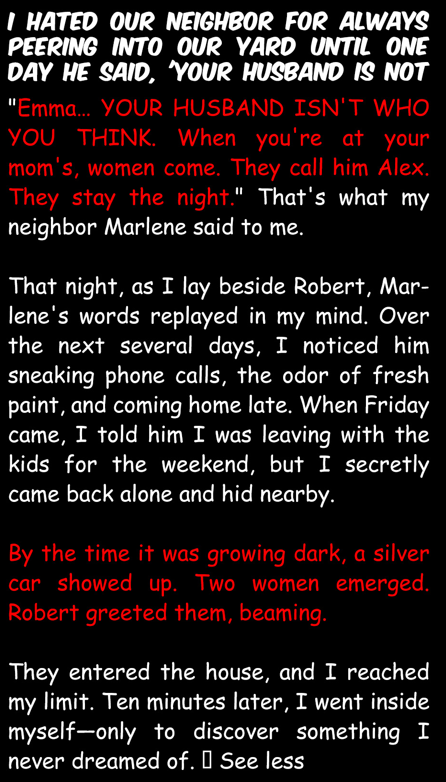👀 The Eyes Over the Fence
Emma had always felt uneasy about her neighbor Marlene. The elderly woman seemed to have an uncanny ability to appear whenever Emma stepped outside—watering her half-dead plants, pretending to prune, always watching. To Emma, Marlene was just a nosy old lady with too much time and too little tact.
But one afternoon, everything changed.
Emma was painting on the porch, the kids playing nearby, when she noticed Marlene leaning on the fence—no tools, no pretense. Just watching. Emma, irritated, confronted her. That’s when Marlene whispered something that shattered her world: “Your husband is not who you think he is.”
Emma laughed nervously, but Marlene was serious. She had seen things—women coming and going from Emma’s house whenever she took the kids to visit her mother. They called her husband by different names. They stayed the night. It wasn’t gossip. It was a warning.
At first, Emma refused to believe it. Her husband was charming, attentive, and successful. But doubt crept in. She began to notice the inconsistencies, the late-night phone calls, the sudden business trips. Eventually, she confronted him—and the truth spilled out. He had been living a double life, using Emma’s absence to entertain other women, hiding behind aliases and lies.
Marlene, once the object of Emma’s scorn, had been the only one truly watching out for her.
This story is a poignant reminder that appearances deceive. Sometimes, the people we dismiss as intrusive are the ones who care the most. And sometimes, the ones we trust without question are the ones hiding the deepest betrayals.
Emma’s journey from denial to truth is painful, but it’s also empowering. She found clarity, strength, and the courage to walk away from a life built on deception. And she learned that real allies don’t always come in the form we expect—they might just be peering over a fence, waiting for the right moment to speak.


